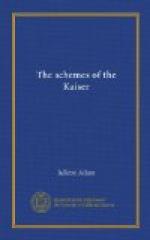What a strange riddle his character presents—this quietist, this worshipper of an angry and a jealous God, with a mania for achieving the happiness of his people in the twinkling of an eye! A strange figure, this Emperor of country squires, who despises the bourgeois and who threatens to despoil the aristocracy of the very privileges which have been the safeguard of the Hohenzollerns’ throne for centuries.
These peculiarities are due to an occult influence which weighs on the mind of William II, an influence which, while it points the way to action, blinds him to its consequences. The dead hand is upon him!
Frederick III, that liberal, bourgeois monarch, compels his reactionary, Old-Prussian-school son, to do those things which he would have done himself, had he not been victimised by Bismarck and his pupil.
I wonder whether the ever-mystical William II sometimes reflects on the ways by which God leads men into His appointed ways? Such thoughts might do more to enlighten him than his way of gazing at the heavens in the belief that all the stars are his.
There is one piece of advice that William’s friends should give him—not to restore the sixty millions of Guelph money to the Duke of Cumberland. This ultra-modern young Emperor will very soon have greater need of the services of the reptile Press than even Bismarck himself; for every one of his latest rescripts adds new public difficulties to the number of those secret ones which the ex-Chancellor, with his infinite capacity for intrigue, will hatch for him.
Bismarck, of the biting wit, who accepts the title of Duke of Lauenburg, because, as he says, “it will enable him to travel incognito,” sends forth from Friedrichsruhe winged words which sink deep into the mind of the people. This phrase, for example, which sums up the whole of William’s policy: “The Emperor has selected his best general to be Chancellor and made of his Chancellor a field marshal.” And Bismarck begs his readers to insert the adjectives, good and bad, where they rightly belong.
April 28, 1890. [3]
Emperor William continues to increase the list of his excursions into every field of mental activity. Intellectually divided between the Middle Ages and the late nineteenth century, it would seem as if he were trying to forget the infirmity of his one useless arm by assuming a prominent role modelled on men of action. He tries to combine in his person the effects of extreme modernism with those of the days of Charlemagne. Because of his very impotence, his desire to grasp and clasp all history is the fiercer, and this emphasises and aggravates the cruelty he showed in relegating Bismarck to compulsory inaction. Just imagine if some power stronger than himself were to compel this ever restless monarch to quiescence! What would be the cumulative effect of want of exercise at the end of a year?




